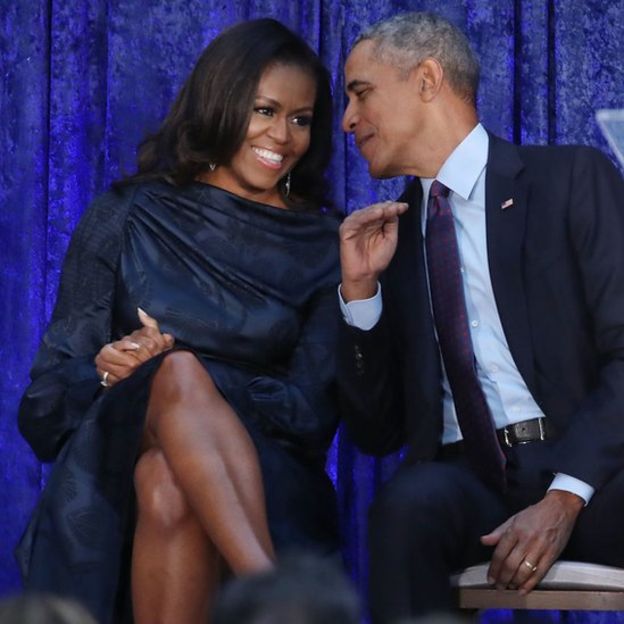7 Key Lessons On Life, Love And Career From Michelle Obama
- Home
- 7 Key Lessons On Life, Love And Career From Michelle Obama

7 Key Lessons On Life, Love And Career From Michelle Obama

Michelle showed the world how a driven, educated woman could make a difference in our system, and her book is filled with remarkable wisdom from a remarkable life.
As a super fan of the Obamas, I was thrilled when Michelle released her memoir “Becoming” last November. I received it as a Christmas gift (one of two Obama-related gifts I received this year, thanks to my widely known infatuation), and I eagerly tore through the pages. The book confirmed what I have always known about Michelle — that she is a brilliant, charismatic, eloquent career woman, a powerful force for change who shines well outside the realm of her husband’s success.
Michelle Obama graduated from Princeton and Harvard Law School before serving in impressive roles as a corporate lawyer, founder of the Chicago chapter of Public Allies, and a community relations director at the U Chicago medical center, among other things. When she became First Lady, Michelle used the role to enact real change, focusing her new power on battling corporations to improve health and nutrition for children, as well as offering better resources for veterans and their families. Michelle showed the world how a driven, educated woman could make a difference in our system, and her book is filled with remarkable wisdom from a remarkable life.
For those of you who haven’t picked up a copy of Becoming yet, below I’ve compiled seven important lessons about life, love, and career we can all learn from Michelle Obama.
AVOID MAKING DECISIONS BASED ON EXTERNAL AFFIRMATION
Michelle ultimately realized that becoming a lawyer was not the right career path for her. As she reflects on how she started on the wrong path in the first place, she writes,
“I can admit now that I was driven not just by logic but by some reflexive wish for other people’s approval, too. When I was a kid, I quietly basked in the warmth that floated my way anytime I announced to a teacher, a neighbor, or one of Robbie’s church-choir friends that I wanted to be a pediatrician. My, isn’t that impressive? Their expressions would say, and I reveled in it. Years later, it was really no different. Professors, relatives, random people I met, asked what was next for me, and when I mentioned I was bound for law school—Harvard Law School, as it turned out—the affirmation was overwhelming… This may be the fundamental problem with caring a lot about what others think: It can put you on the established path—the my-isn’t-that-impressive path—and keep you there for a long time. Maybe it stops you from swerving, from ever even considering a swerve, because what you risk losing in terms of other people’s high regard can feel too costly.”
As difficult as it can be to drown out influencing voices, your future belongs to no one but you. When you’re faced with a big decision, try to think more about what you actually want than what other people might want for you.
DON’T BE AFRAID TO TAKE A DETOUR
Michelle herself went straight from Princeton to Harvard Law, but in her book, she remembers an old boyfriend who took a less direct approach to his goals. After graduating from Princeton pre-med, he elected not to apply to medical schools, instead auditioning to become a sports mascot.
“He did ultimately become a doctor, evidently a very good one… At the time—and unfairly, I think now—I judged him for the swerve. I had no capacity to understand why someone would take an expensive Princeton education and not immediately convert it into the kind of leg up in the world that such a degree was meant to yield. Why, when you could be in medical school, would you be a dog who does handsprings? But that was me. And as I’ve said, I was a box checker—marching to the resolute beat of effort/result, effort/result—a devoted follower of the established path.”
Try to release yourself from the idea that career paths are ladders to be climbed, vertical and straight. Detours that seem totally unrelated to your future goals can actually be important opportunities to discover who you are and what you really want, giving you space to breathe and think, and thereby helping you avoid wasting time on the wrong paths.
DON’T BE AFRAID TO CHANGE COURSE COMPLETELY
When Michelle realized that she didn’t want to use the law degree she had amassed a mountain of debt to achieve, she felt stumped as to what she might want to do instead. She knew she didn’t feel fulfilled, but she didn’t know where to go from there:
“I hated being a lawyer. I wasn’t suited to the work. I felt empty doing it, even if I was plenty good at it. This was a distressing thing to admit, given how hard I’d worked and how in debt I was. In my blinding drive to excel, in my need to do things perfectly, I’d missed the signs and taken the wrong road… what shook me most was I had no concrete ideas about what I wanted to do. Somehow, in all my years of schooling, I hadn’t managed to think through my own passions, and how they might match up with work, I found meaningful. As a young person, I’d explored exactly nothing. Barack’s maturity, I realized, came in part from the years he’d logged as a community organizer and even, prior to that, a decidedly unfulfilling year he’d spent as a researcher at a Manhattan business consulting firm immediately after college. He’d tried out some things, gotten to know all sorts of people, and learned his own priorities along the way. I, meanwhile, had been so afraid of floundering, so eager for respectability and a way to pay the bills, that I’d marched myself unthinkingly into the law.”
If you find yourself in a career or even a relationship that doesn’t make you happy, don’t be afraid to swerve in a completely new direction. Even though it might not feel like it, you have more to gain than you have to lose.
TRY NOT TO COMPARE YOURSELF WITH OTHERS
When Barack graduated from law school, he was faced with a host of professional opportunities. Michelle writes about how he chose his next steps without allowing superficial factors like prestige or salary to distract him:
“Barack had worked hard and dutifully for everything he was now being given, but he wasn’t notching achievements or measuring his progress against that of others, as so many people I knew did—as I sometimes did myself. He seemed, at times, beautifully oblivious to the giant rat race of life and all the material things a thirty-something lawyer was supposed to be going after, from a car that wasn’t embarrassing to a house with a yard in the suburbs or a swank condo in the Loop.”
When making career decisions, try to be like Barack – focus on the deeper, more gratifying elements of your work, and don’t worry about how “successful” you will seem compared with your peers.
EMBRACE THE UNKNOWN
When Michelle decided to try to move out of her successful law career and into something she was passionate about, she felt paralyzed by the unknowable nature of that change. She writes,
“Again and again, I’d read the caution and concern on so many faces when I spoke of having loans to pay off, of not yet having managed to buy a house… I still walked around with my mother’s advice ringing in my ear: Make the money first and worry about your happiness later. Compounding my anxiety was the one deep longing that far outmatched any material wish: I knew I wanted to have children, sooner rather than later. And how would that work if I abruptly started over in a brand-new field?”
Fortunately, Michelle had Barack’s “simple, buoying faith” to support her:
 “His was the lone voice telling me to just go for it, to erase the worries and go toward whatever I thought would make me happy. It was okay to make my leap into the unknown, because… the unknown wasn’t going to kill me.”
“His was the lone voice telling me to just go for it, to erase the worries and go toward whatever I thought would make me happy. It was okay to make my leap into the unknown, because… the unknown wasn’t going to kill me.”
If fear is stopping you from pursuing something you know you want, try to imagine Barack Obama encouraging you to just go for it.
ASK FOR WHAT YOU NEED
This one definitely applies to both career and love, and Michelle provides an example of both. When Barack has to leave Chicago to finish his Harvard Law degree, he warns Michelle that he’s “not much of a phone guy.” Rather than accept this, Michelle makes her needs clear:
“I informed Barack that if our relationship was going to work, he’d better get comfortable with the phone. ‘If I’m not talking to you,’ I announced, ‘I might have to find another guy who’ll listen.’ I was joking, but only a little. And so it was that Barack became a phone guy.”
She uses the same clear-eyed communication to negotiate her salary when she wants to take a job working for a new nonprofit, Public Allies, but the salary she’s offered presents a barrier:
“I was initially offered a salary so small, so far below what I was making working for the city of Chicago, which was already half of what I’d been earning as a lawyer, that I literally couldn’t afford to say yes… It became clear that if I wanted to join the tribe, I’d have to negotiate my way in, asking for exactly what I needed in terms of salary, which was significantly more than Public Allies had expected to pay. This was simply my reality. I couldn’t be shy or embarrassed about my needs. I still had roughly $600 of student debt to pay off each month on top of my regular expenses, and I was married to a man with his own load of law school loans to cover. The organization’s leaders were almost disbelieving when I informed them how much I’d borrowed in order to get through school and what that translated to in terms of monthly debt, but they gamely went out and secured new funding that enabled me to come on board.”
In both situations, Michelle knew her own value and wasn’t afraid to ask for what she needed. You might be surprised what people are willing to do for you if you channel her active self-worth and simply ask.
TAKE NOTHING FOR GRANTED
Even a life as impressive and full as Michelle Obama’s comes with a certain amount of loss. Michelle writes about a close friend from college, Suzanne, a woman who rejected a spot at an ivy league business school because it didn’t seem like enough “fun,” and who later left a job at the Federal Reserve to travel for a few months. Suzanne’s carefree, adventurous approach to life created a direct contrast to Michelle’s:
“During the fall of 1989, while I wore patent leather pumps and sat through long, dull conference-room meetings at Sidley, Suzanne and her mother were trying not to spill curry on their sundresses in Cambodia and dancing at dawn on the grand walkways of the Taj Mahal. As I balanced my checkbook, picked up my dry cleaning, and watched the leaves wither and drop from the trees along Euclid Avenue, Suzanne was careening through hot, humid Bangkok in a tuk-tuk, hooting—as I imagined it—with joy.”
When Suzanne passed away from cancer at the age of 26, it caused Michelle to reconsider whose method of living held more wisdom. When she later lost her father to MS, it prompted her to make a change:
“Losing my dad exacerbated my sense that there was no time to sit around and ponder how my life should go. My father was just fifty-five when he died. Suzanne had been twenty-six. The lesson there was simple: Life is short and not to be wasted. If I died, I didn’t want people remembering me for the stacks of legal briefs I’d written or the corporate trademarks I’d helped defend. I felt certain that I had something more to offer the world.”
While Michelle imparts much more wisdom throughout the rest of the book, I found her candid search for meaningful work particularly relatable. Hopefully, we can all learn from her journey and find our way to our own fulfilling paths that much sooner.
Source: cleverishmagazine.com
- Share
Classic Ghana
Classic Ghana brings you into a fun world of arts, entertainment, fashion, beauty, photography, culture and all things in between. Let’s explore these together!







